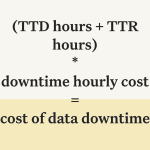The rise in data usage and exponential growth of remote work in recent years has increased the need for reliable data protection centers all around the world. Since data centers are critical for wide-scale networking, data storage, and information sharing, they require exceptional security measures to safeguard them from rapidly evolving physical and digital threats.Read on to … [Read more...] about Cybersecurity Best Practices for Data Center Protection
Big Data
Learn everything you need to know about big data. Find out how companies are using this revolutionary technology and what it means for your business strategy.
The Right Way to Measure ROI on Data Quality
Last week, I was on a Zoom call with Lina, a Data Product Manager who oversees a data quality program for her organization. Her team is responsible for maintaining 1000s of data pipelines that populate many of the company's most business critical tables. Reliable and trustworthy data is foundational to the success of their product, yet Lina was struggling to find a clear way … [Read more...] about The Right Way to Measure ROI on Data Quality
How Big Data Can Enable Employee Productivity Amidst the WFH Boom
In the wake of the Covid-19 pandemic, countless industries have witnessed a profound shift in how employees operate within their roles at their respective companies. Whilst some still expected a mass migration to take place in which workers returned to their office desks, such a return to pre-pandemic 'normality' is yet to materialize on the same scale as before. As more … [Read more...] about How Big Data Can Enable Employee Productivity Amidst the WFH Boom
A Complete Guide to Customer Relationship Management
When it comes to running a business, one of the most important things is keeping your customers happy. There's no better way to do this than having a solid but simple CRM system in place. It allows you to keep track of all the different ways you communicate with your consumers. This isn't it. There's so much more you can accomplish with the help of customer relationship … [Read more...] about A Complete Guide to Customer Relationship Management
Are data sharing agreements legally binding?
Data sharing agreements are legally binding contracts that are usually drawn up between data collectors and data recipients. What are Data sharing agreements? Data sharing agreements stipulate the rights of both parties in regards to the use of the data collected, who can have access to it, and how it can be used. Data sharing agreements may not always be legally binding. They … [Read more...] about Are data sharing agreements legally binding?
What is big data?
Big data is a term that refers to the massive amount of digital data created and shared every day. Big data can transform how we live, work, and communicate. It can be used to improve everything from public health and urban planning to business and marketing.
Big data is also changing the way we think about privacy and security. The volume, velocity, and variety of big data present challenges and opportunities for organizations and individuals. Regardless, big data is here to stay, and its impact will only continue to grow in the years to come.
What is big data analytics?
Big data analytics is the process of turning large, complex data sets into actionable insights. Businesses use various analytical tools and techniques, including machine learning and statistical analysis, to do this.
Big data analytics can be used to improve decision-making in areas like marketing, operations, and customer service. It can also be used to identify new business opportunities and optimize existing processes. With the help of big data analysis, businesses can gain a competitive edge by using their data better.
Want to learn more about big data? Datafloq has courses available. Contact us to get started.
When was big data introduced?
The term big data was coined in the 1990s, with some giving credit to John Mashey for popularizing the term. However, the concept of big data has been around for much longer.
Where does big data come from?
In the early days of computing, scientists and businesses began to realize that the amount of data being generated was increasing exponentially. As a result, they began to develop new methods for storing and processing data.
Over time, these methods have become increasingly sophisticated and have played a key role in enabling businesses to make sense of vast amounts of information. Today, big data is used in various industries, from retail to healthcare, and its importance is only likely to grow in the years to come.
What are examples of big data?
One of the most common examples of big data is social media data. With over 2 billion active users, Facebook generates a huge amount of data every day. This includes information on user interactions, posts, and even location data. Analyzing this data can help companies better understand their customers and target their marketing efforts.
Another example of big data is GPS signals. These signals are constantly being generated by devices like cell phones and fitness trackers. When combined with other data sets, GPS signals can be used to provide insights into everything from traffic patterns to human behavior. Finally, weather patterns are another type of big data set. By tracking these patterns over time, scientists can better understand the impact of climate change and develop strategies for mitigating its effects.
How do companies use big data?
Companies use big data in marketing, product development, and customer service. By analyzing large data sets, businesses can identify patterns and trends that would be otherwise difficult to spot. For example, a company might use big data to track customer behavior patterns to improve its marketing efforts.
Alternatively, a company might use big data to improve its products by identifying areas where customers are most likely to experience problems. For instance, big data can be used to improve customer service by finding pain points in the customer journey. Ultimately, big data provides companies with a valuable tool for gaining insights into their business operations.







